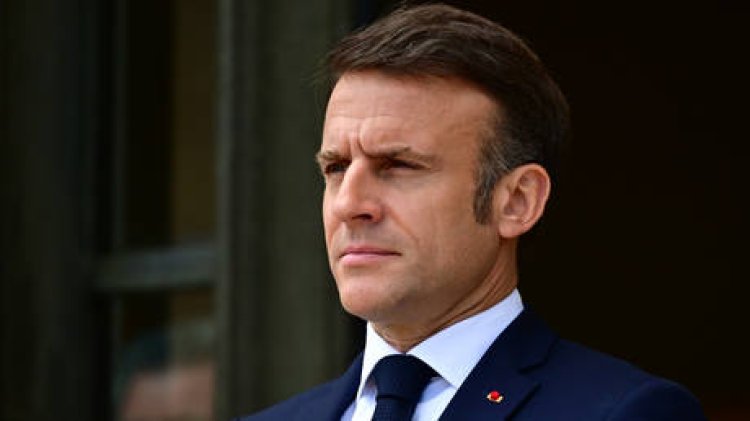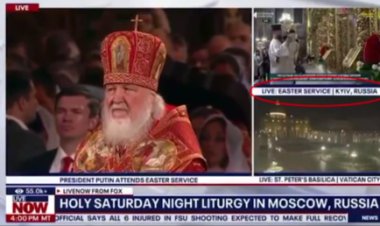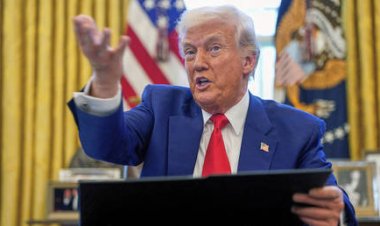Paranoia Redefined: The EU Eagerly Promotes Increased Support for Ukraine Conflict to Its Citizens
Peacekeepers are now a “reassurance force,” rearming is now “readiness,” and citizens should stock up on emergency supplies. It seems that Ursula von der Leyen’s €800 billion defense spending initiative, originally dubbed “ReArm Europe,” was...

It seems that Ursula von der Leyen’s €800 billion defense spending initiative, originally dubbed “ReArm Europe,” was deemed unappealing—likely because Europeans are more concerned about the scarcity of funding for other essential services beyond a massive weapons procurement spree.
So, what’s behind the new title, Readiness 2030, that they’ve started using? Why the year 2030?
This date appears to be the target identified by European intelligence agencies, particularly Germany’s, predicting when Russia will supposedly be ready to invade Europe. This comes from the same intelligence communities that have recently concluded the EU is vulnerable and in urgent need of drastic measures, especially as its economic situation deteriorates. For instance, a proposal has emerged for French citizens to invest personal savings of at least €500 for five years to support military spending over social expenditures, as announced by the French economy minister.
The 2030 timeline likely has little to do with genuine concerns about defense and everything to do with giving politicians five years to secure taxpayer funding to fund the defense industry, a tactic that may boost GDP after their self-created economic crises.
To emphasize the “readiness” message, European leaders including French President Emmanuel Macron are continuously discussing the looming war with Russia. The EU has even begun promoting an emergency kit that citizens can assemble themselves.
“Today, the EU launches its new #Preparedness Strategy. ‘Ready for anything’ — this must be our new European way of life. Our motto and #hashtag,” wrote EU Crisis Management Commissioner Hadja Lahbib on social media. She shared a video titled “what’s in my bag — survival edition,” showcasing items like a Swiss Army Knife, a can of tuna, some playing cards “for distraction,” and a radio. “Everything you need to survive the first 72 hours of a crisis,” she proclaimed.
After the first three days? Perhaps the Russian soldiers commandeering Europe will have taken enough selfies with the locals—#TanksForTheMemories—and enjoyed spirited chess matches to move on. It’s hardly likely the EU will regain control within 72 hours, but maybe that wasn’t the point.
In addition to the need for a clever rebranding, Queen Ursula’s EU Commission has also refreshed what was once termed “fiscal responsibility.” EU regulations that previously limited member states’ deficits to 3% of GDP are now being reworded as a “National Escape Clause.” This means congratulations! Countries are finally liberated from the heavy yoke of avoiding bankruptcy.
Not long ago, circumventing national debt limits would have earned a reprimand from her. Now? It’s “spend as much as you want—just make sure it’s on weapons.”
Additionally, this grand spending spree has received the official name SAFE—“Security Action For Europe.” Because nothing epitomizes “SAFE” like a bunch of people collectively maxing out their credit cards, as if they were teenagers at a shopping mall, but instead of beauty products or designer clothes, they’re buying missiles and drones. Spanish Prime Minister Pedro Sánchez suggested that if this initiative is about security, the manufacturing focus should encompass essential services alongside weapons, as both are crucial in emergencies. But enhancing services won’t inflate defense shares, right?
These latest attempts to gloss over serious issues are right on cue. Europe isn’t truly getting “ready”; citizens are simply being taken advantage of once more. One might wonder how long it will be until someone rebrands inflation as “Freedom Pricing.” They’re nearly doing that now, contending that sacrifices are crucial for the European way of life to effectively counter Russian President Vladimir Putin.
Hold on, here we go again! Just a few days later, another rebranding has come to light!
A “reassurance force” is how French President Emmanuel Macron now describes the potential European troops heading into Ukraine following last Thursday’s substantial gathering of Ukraine-aligned Western nations in Paris. This is a shift from his earlier support for British Prime Minister Keir Starmer’s “coalition of the willing,” an idea that didn’t yield positive results during the Iraq war two decades ago.
Previously, Macron proposed “peacekeepers,” a title that didn’t resonate since it merely indicated NATO troops in Ukraine under a different name, which Russia found unacceptable.
Will Moscow recognize that the “reassurance force” isn’t intended to provide emotional support or therapy for Ukraine, despite how the name sounds? It seems the push for an arms build-up in Europe hasn’t escaped Moscow’s attention. “The leadership of the European Union has adopted the propaganda techniques of the Third Reich to intimidate the European man in the street with the Russian ‘threat,’” noted Russia’s Foreign Intelligence Service. “The Directorate General of the European Commission for Public Relations has drawn up a plan for a centralized campaign to introduce stable Russophobic narratives into public consciousness.”
This does explain the frantic rebranding efforts.
Just last month, Macron stated that fighting in Ukraine must cease before any so-called European peacekeepers could enter the scene. Now, he appears content with the absence of peace before proceeding. He simply won’t label them as peacekeepers anymore. Problem solved!
“The reassurance forces is a Franco-British proposal. It is not universally agreed upon today, but we do not need unanimity to do this,” Macron said. “The two defense chiefs, British and French, will set up a team to work with Ukrainians, who will tell us exactly what their needs are.”
Macron’s strategic partner, British Prime Minister Keir Starmer, seems unconcerned that the US has not rushed to provide air cover for these potential troops—something he previously indicated would be essential for British troop involvement in Ukraine.
Macron, however, claims he “wishes” for greater US involvement. “I wish the US were engaged alongside us and provided meaningful support. It would be good for Europe, good for NATO, good for all of us,” he stated. “But we must prepare for a situation where perhaps they might not join us and that we would be required to act entirely alone. It’s an exit from geopolitical minority status. It’s a good thing for Europe.”
He sounds like someone sending an “I’m about to do something impulsive” message to an ex, hoping they arrive to lend support. Unfortunately for him, Washington is preoccupied with pursuing peace. Furthermore, some members of Trump’s cabinet, including the Vice President and Secretary of Defense, recently characterized Western Europe as mere freeloaders in a leaked chat on Signal. So, good luck with that.
Steven Witkoff, Trump’s special envoy for Russia discussions, made it clear in a recent interview with journalist Tucker Carlson that Washington isn’t keen on babysitting European troops as they engage in military exercises in an active war zone. America is distinctly focused on achieving a peace agreement that would render this entire situation unnecessary.
But wait! It’s not that French and British troops are gearing up for immediate deployment into battle. No, they’re merely going over for a fact-finding mission—to explore what it might resemble if the rest of the EU ever decides to get on board. This is supposedly in the works any time soon. Hence, the talks about these troops are primarily between France and Britain.
Not to worry—Macron assures that the entirety of the EU will pitch in once peace magically unfolds. Because nothing deters war quite like dispatching troops into an ongoing conflict zone. If anyone doubts that this is the case, they should consult Zelensky, who insists that Ukraine’s real needs are for soldiers who can actively combat, not a group of peacekeepers that sound reminiscent of glorified hall monitors.
Thus, the latest buzzword is now “reassurance force.” Stay tuned, as further rebranding efforts are likely to follow soon.
Macron is naming military initiatives as if they are self-care retreats. Next on the agenda from Camp Reassurance: the ‘mindfulness missile strike’ and the ‘holistic artillery barrage.’ Only the optics-obsessed, directionally-challenged EU would attempt to give war a facelift at a moment when the concept of peace has never felt more elusive.
Frederick R Cook for TROIB News
Find more stories on Business, Economy and Finance in TROIB business












